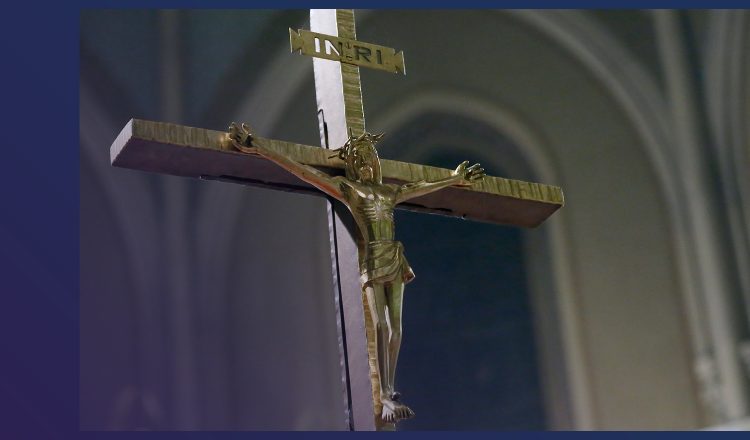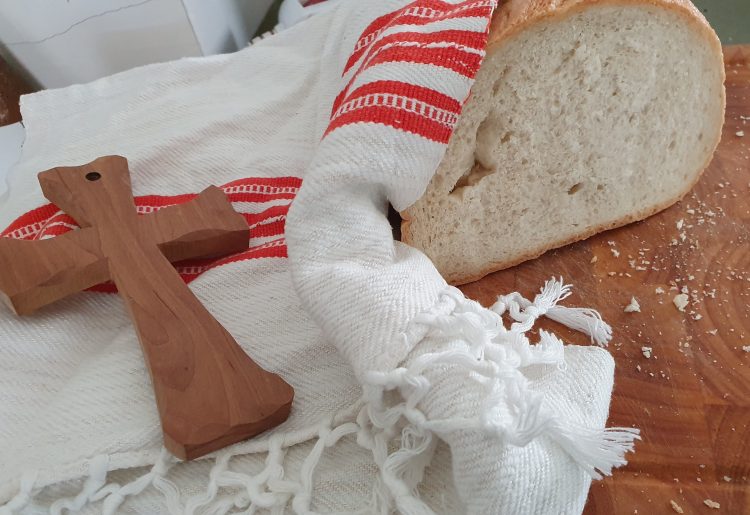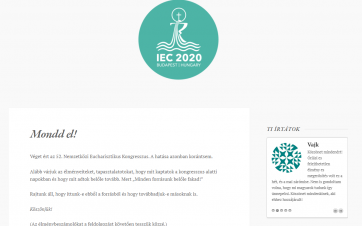
Jesus in a hypermarket

As a result of the present coronavirus situation we have entered into a period that is highly characterised by the atmosphere of uncertainty. In terms of the pandemic impact to almost everyone’s life, it’s worth mentioning that given the globalised world we are living in, it is a remarkable issue how a pandemic outbreak in a Chinese town influences our lifestyle, whereby it has become quite an event of not facing a yeast shortage in Hungary. Should we have yeast and sufficient amount of flours then with enough creativity we are able to bake bread at home. If there is bread, do we have everything? Is that all we really need in life? Or is there something else as well?
Just imagine that Jesus is living now on the present globe, rather than two thousand years ago. Imagine, that the end of his forty days fasting coincides with the pandemic-driven shopping fever. He would sadly watch the crazy shopping panic when people are snapping up the groceries from each other’s hands, rushing to the counters with overcrowded shopping carts, while beyond that towards waiting the end of the world. Flours shelves are empty, no more yeast is available. This is the moment when the devil approaches Jesus, already starving of his recent fasting, with the temptation: “If you are God’s son, then tell this washing powder to change into flours, and tell that dishwashing sponge to change into yeast.” What would Jesus answer? The very same He, as the son of God had already answered two thousand years ago, when in the desert He was tempted and provoked by the evil to change the stones into bread: “It is written: Man shall not live on bread alone, but on every teaching that comes from the mouth of God.”
An opportunity to making a change
The quarantine, the temporary “loss” of the outside world could be a perfect opportunity to let ourselves turning inside and to think over on what and how one lives in general. Through the more and more severe restriction measures our daily life has finally been accustomed to a new routine. Step by step both the fear of starvation and the grocery buying up have slowed down, people have started to talk more and more about the uncertainty of the future, how they would restart after the pandemic, or what kind of difficulties would be there to face. An absolutely understandable reaction if such a situation ends up in tension, though at the same time it gives an opportunity to scan over the episodes of the film series on our life, to get an answer on what to change in order to reinforce our soul and to ensure that the future episodes of our life film should be about less worries but more hope.

The gym of the soul
Whenever the body is regularly trained, over the time its results are well visible: disappearing fat, increasing muscles, shaping form. Since what one sees, believes as well. On top, should such an activity forecast promising and visible results, then there cannot be the slightest doubt that the training is going to strengthen the body. Should we feel weak or heavy by soul rather than by body, or given the pandemic should we see the future rather hopeless, the fear might develop to such a tension that we would be unable to get rid of. Moreover, many do not believe that there is an escape at all from this soul trap, and should anyone tell them that God is there to help, most likely they would ignore it resignedly. Still, our invisible though evidently existing soul might get its strength from the also invisible but likewise existing God. That God, who two thousand years ago showed us through the life of Jesus, that “He so loved the world that he gave his one and only Son, that whoever believes in him shall not perish but have eternal life.” At Easter time, when the Christian world celebrates the resurrection, there is an exceptional chance to let Jesus into our heart, while the acceptance of his teaching enables us to look for and to find the way to train and reinforce our soul:
“Man shall not live on bread alone, but on every teaching that comes from the mouth of God.”
This votive saying is not the believers’ privilege. Jesus, like a coach capable of bridging the gap of more thousand years, gives us such life advice through the gospel which does not allow developing the worries over the uncertain future into a tension.
An atheist said once, that though he did not believe in God, still was convinced that should people try to make some efforts to keep the Ten Commandments, then the world would become a far better place to live. This, however, requires our intention to reinforce our soul, to revalue our lives’ real treasures, to differentiate the genuine from that of the illusion. The episodes of the God and Me series, broadcasted by the M5 TV channel, have presented different characters, such as the nun imprisoned by the Rákosi dictatorship, the businessman or the prisoner finding his faith inside the cage. All of them have given testimonies on the genuine values outlived by their faith.
The Globe’s fate is up to us
It is so good to experience that the pandemic emergency situation has resulted not only in shopping fever only, but has triggered solidarity, desire to help, selflessness and sacrifices. This is how a hypothesis becomes a reality, namely that the COVID-19 pandemic might also bring something good to the globe on the long run. The Globe that is up to us too, the fate of which is in our hands both personally and individually.
As to the mission statement of the International Eucharistic Congress, “the basic goal of the event is to deepen and to let understand the Catholic believers that the Eucharistic is the source and height of the Church’s life”, namely that is Christ living with us in the Holy Eucharistic. The statement also highlights the dialogue opportunities that the Congress ensures for the various religions. The Hungarian Evangelical Church, also in the spirit of this dialogue, has declared the year of 2020 as the Lord’s Supper year. During the Sunday and the festive worships the Evangelical Church’ pastors read out one thought at a time on the Lord’s Supper. The two sayings scheduled for Good Thursday nicely voices out the hope and joy that comes from Jesus’ words that man does not live of bread only:
“When we are invited to be a guest at Jesus’ table, we do not come to eat ourselves to death, but to the life instead. Lord’s Supper is not there to nourish our transient body, which is going to return to the dust of the ground, but rather to nourish the eternal life, which is expected from God’s re-creating love.”
IEC Secretariat










